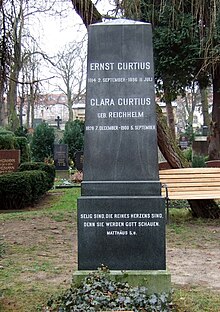Ernst Curtius
Ernst Curtius | |
|---|---|
 Photograph from Imagines Philologorum by Alfred Gudeman | |
| Born | 2 September 1814 |
| Died | 11 July 1896 (aged 81) Berlin |
| Nationality | German |
| Known for | Olympia |
| Scientific career | |
| Fields | archaeology |

Ernst Curtius (/ˈkʊərtsiˌʊs/; 2 September 1814 – 11 July 1896) was a German archaeologist and historian.
Biography

He was born in Lübeck. On completing his university studies he was chosen by C. A. Brandis to accompany him on a journey to Greece for the prosecution of archaeological researches. Curtius then became Karl Otfried Müller's companion in his exploration of the Peloponnese, and on Müller's death in 1840 he returned to Germany. In 1844 he became an extraordinary professor at the University of Berlin, and in the same year he was appointed tutor to Prince Frederick William (afterwards the Emperor Frederick III), a post which he held until 1850.[1]
After holding a professorship at Göttingen and undertaking a further journey to Greece in 1862, Curtius was appointed (in 1863) ordinary professor at Berlin. In 1874 he was sent to Athens by the German government and there concluded an agreement by which the excavations at Olympia were entrusted exclusively to Germany. In 1891 Curtius was elected a member of the American Antiquarian Society.[2] Curtius died in Berlin on 11 July 1896.[3]
Works
His best-known work is his History of Greece (1857–1867). It presented in an attractive style what were then the latest results of scholarly research, but it was criticized as wanting in erudition. It is now superseded. His other writings are chiefly archaeological. The most important are:
- Die Akropolis von Athen (1844)
- Naxos (1846)
- Peloponnesos, eine historisch-geographische Beschreibung der Halbinsel (1851)
- Olympia (1852)
- Die Ionier vor der ionischen Wanderung (1855)
- Attische Studien (1862–1865)
- Ephesos (1874)
- Die Ausgrabungen zu Olympia (1877, etc.)
- Olympia und Umgegend (edited by Curtius and F Adler, 1882)
- Olympia. Die Ergebnisse der von dem deutschen Reich veranstalteten Ausgrabung (with F Adler, 1890–1898)
- Die Stadtgeschichte von Athen (1891)
- Gesammelte Abhandlungen (1894)[4]
His collected speeches and lectures were published under the title of Altertum und Gegenwart (5th ed., 1903 foll.), to which a third volume was added under the title of Unter drei Kaisern (2nd ed., 1895).[4]
Family
His brother, Georg Curtius, was a noted philologist.
References
- Notes
- ^ Chisholm 1911, p. 652.
- ^ American Antiquarian Society Members Directory
- ^ Chisholm 1911, pp. 652–653.
- ^ a b Chisholm 1911, p. 653.
- Sources
- This article incorporates text from a publication now in the public domain: Chisholm, Hugh, ed. (1911). "Curtius, Ernst". Encyclopædia Britannica. Vol. 7 (11th ed.). Cambridge University Press. pp. 652–653. This work in turn cites:
- L. Gurlitt, Erinnerungen an Ernst Curtius (Berlin, 1902) This work has a full list of his writings.
- Otto Kern (1903), "Curtius, Ernst", Allgemeine Deutsche Biographie (in German), vol. 47, Leipzig: Duncker & Humblot, pp. 580–597
- F. Curtius, Ernst Curtius. Ein Lebensbild in Briefen (1903)
- T. Hodgkin, Ernest Curtius (1905)
External links
- Beach, Chandler B., ed. (1914). . . Chicago: F. E. Compton and Co.
 Media related to Ernst Curtius at Wikimedia Commons
Media related to Ernst Curtius at Wikimedia Commons- An Olympic Excavation, a description of Curtius' excavations at Olympia
- Ernst Curtius Papers. General Collection, Beinecke Rare Book and Manuscript Library, Yale University.
You can help expand this article with text translated from the corresponding article in German. (October 2016) Click [show] for important translation instructions.
|
- 1814 births
- 1896 deaths
- Archaeologists from Lübeck
- German historians
- Ancient Olympia
- 19th-century historians
- 19th-century German writers
- 19th-century German male writers
- Members of the American Antiquarian Society
- Members of the Bavarian Maximilian Order for Science and Art
- Recipients of the Pour le Mérite (civil class)
- German male non-fiction writers
